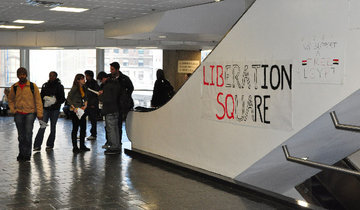… But Many Don’t
By Flor-Ann Estiler on Jun 05, 2011
I walked into the Undergraduate Student Government office located in Room 121 on the first floor of the North Building early in the semester, and approached two people who were fixated on computer screens. I asked if anyone was willing to do an interview with me about USG, such as, how it came about and what exactly goes down during meetings of its committees. They seemed too preoccupied with what they were doing and both said that it wasn’t the right time to do an interview.
The student fees collected from me every year, as from all undergraduates, pay the salaries of USG elected members and its staff, so it should be understandable that I was put off by their attitude.

Frustrated, I left the office. I imagined later that they were in a rush to get their work done because it was a Friday when the office closes early. Perhaps, I should have persisted but resorted to my backup plan. As soon as I got home, I researched USG’s constitution on the Hunter web page. I learned the following. USG serves to:
“Protect students’ rights, students’ welfare, student involvement in academic policy and curriculum formation, and provides an awareness of local, national and International affairs of significance to students.” USG a long time ago was divided into two bodies, Day Session Student Government and the Evening Session Student Government. This present student government represents all undergraduates, both matriculated and non-matriculated. Four students from each class group are elected to the Senate. Executive Board Members are elected by the student body. The elections for these positions usually take place between the first and third weeks of April. Several years ago, allegations about corruption in student government were rampant when the Student Liberation Action Movement was in control of student government but the corruption sentiment faded after SLA was driven from office.
The USG Senate serves to “appropriate all funds for student activities, approve all USG budgets, and take any action necessary to protect and represent the students of Hunter College and their interests.” The Senate chair is a liaison between the Student Senate and Executive Board. “This Chairperson shall conduct Senate meetings, prepare and distribute the agenda two days prior to the meeting and keep an accurate record of attendance. She/he shall sit on the Executive Board and carry one vote.” The Executive Board controls all of USG’s policies and procedures and takes action on all or any decisions made.
Commissioners of the Board are official representatives of the Hunter College student body. They serve to take action on any current issues of either a student or an elect from the Senate. They must be accessible at all times, write weekly progress or verbal reports for the Executive Board, attend meetings, and attend ten weekly office hours between Monday to Friday. The President has the highest authority, and is a member of the College Association, Finance Control Board, and Academic Senate. He or she is responsible for maintaining records and approving all budgets. The Vice President is a liaison between the Executive Board and all of USG. He or she is responsible for supervising the activities in the Student Research Center as well as the Student Lounge. Check out: USG Constitution.
Besides gathering info on USG, this writer was assigned to get info on the Hunter College Senate and the Hunter College Ombuds Office. The assignment also required this writer to review the College’s grade appeals procedure, Academic Freedom as postulated for this campus and guidelines for students who may want to file complaints against faculty.
The Hunter College Senate
 I didn’t trek to the Senate Office located on the ninth floor of the East Building. I used the Hunter web page. The Senate was established in 1970 and has complete power to review College policy and make changes if necessary without the consent of the New York State Board of Education. With 202 members made up of both faculty and students, it has a chair, vice-chair, secretary and a chair of the Evening Council which make up the Administrative Committee. It focuses on curriculum and related education matters, academic requirements and standards of academic standing, development, review and planning of facilities, staff and fiscal requirements, evaluation of teaching, and protecting students’ academic freedom. Check here for the Senate. Office number: (212) 772-4200.
I didn’t trek to the Senate Office located on the ninth floor of the East Building. I used the Hunter web page. The Senate was established in 1970 and has complete power to review College policy and make changes if necessary without the consent of the New York State Board of Education. With 202 members made up of both faculty and students, it has a chair, vice-chair, secretary and a chair of the Evening Council which make up the Administrative Committee. It focuses on curriculum and related education matters, academic requirements and standards of academic standing, development, review and planning of facilities, staff and fiscal requirements, evaluation of teaching, and protecting students’ academic freedom. Check here for the Senate. Office number: (212) 772-4200.
The Ombuds Office
It reviews complaints from any member of the Hunter community though it’s safe to say that most students don’t know that it exists. The Ombuds Person works as an independent agent, and investigates and takes action, such as counseling, negotiating, or persuading parties to resolve issues. [Editor’s Note: The office is suppose to be nonpartisan but some Ombuds Officers have been known to cross the line of impartiality and indulge their preferences.] Complaints can be filed anonymously to the office. Read more here. Office number: 212]772-4203
Grade Appeals
It’s safe to say that most students are unaware that they can appeal final grades. According to the Senate rules, students unsatisfied with their grades must try to negotiate with the grading instructors, first and foremost. Such meetings, according to written guidelines, must be held within the first three weeks of the semester following a grade receipt but there is flexibility regarding the time issue. Students who can’t connect with instructors can write an appeal and give it in to the Department Chair. This grade appeal must be given in within the first five weeks of the semester following a grade receipt but, again, there is flexibility. Students appealing a grade in the Nursing School or any Science/Health related fields must give the appeal to the Director of the School, while any student appealing to the grade in the field of Social Work must hand it in to the Dean of the school.
Subsequently, a Department Chair will then call together three of their members who are familiar with the course and discuss the appeal within the first week of that appeal given in. They have the power to either maintain or change the original grade of the student, prior to evidence of the grading procedures in the instructor’s syllabus, which is handed out at the beginning of the semester. Grade appeal directions and forms can be found in the Senate Office in Room 1018 East Building.
An appeal can be made to the the Senate if either a student or instructor is unhappy with the grade appeal decision. The Senate Grade Appeals Committee consists of four faculty members and three students who then review all necessary evidence provided to them. Their decision shall be the final decision of the grade appeal.
Academic Freedom
The Standing Committee on Academic Freedom was established September 27, 2006 and serves “to monitor, examine and report annually to the Senate on the status of academic freedom at the college; to make appropriate recommendations regarding academic freedom policies and practices to the college’s governance bodies and, as appropriate, through those bodies to the University Faculty Senate; to investigate possible violations of academic freedom.” Click (here for more info.
Student Complaints Against Faculty
 If a student wants to file a complaint against an instructor, he or she must contact the chief student
If a student wants to file a complaint against an instructor, he or she must contact the chief student 
affairs officer wlho will then make a suggestion to the student of which procedure is appropriate depending on the type of complaint. Students are encouraged to deal it informally first with the targeted member of the faculty. They should consult with the professor or instructor first before taking it to the next level. If informal resolution gives unsatisfying results, “the student may file a written complaint with the department chairperson or, if the chairperson is the subject of the complaint, with the academic dean or a senior faculty member designated by the college president.” The complaint must be made within the thirty days of the alleged conduct. The fact finder (person who received the student’s complaint) will negotiate with both the student and member of the faculty either together or individually to resolve the complaint. Complaint forms can be found in the office of Advising Services in Room E1119.
“If resolution is not possible, and the Fact Finder concludes that the facts alleged by the student, taken as true and viewed in the light most favorable to the student, establish that the conduct complained of is clearly protected by academic freedom, he or she shall issue a written report dismissing the complaint and setting forth the reasons for dismissal and send a copy to the complaining student, the faculty member, the chief academic officer and the chief student affairs officer.”
If that is not the case, the fact finder can conduct an investigation for further information in order to make the final decision. Both faculty member and student have a right to have a representative on their side, should it be helpful for the fact finder. If results are unsatisfying, either the faculty member or student can write an appeal to the chief academic officer. The appropriate college official serves the right to make the necessary actions on this appeal.
Flor-Ann Estiler can be contacted at florann.estiler@gmail.com